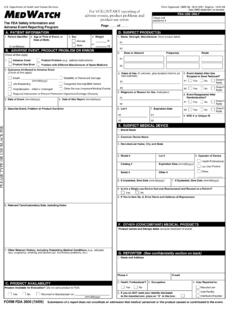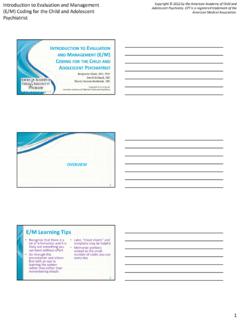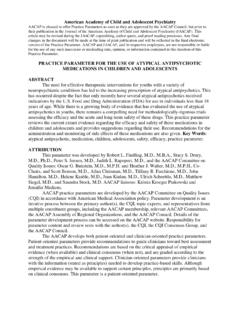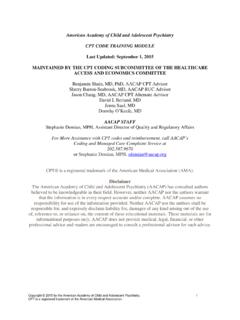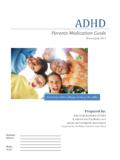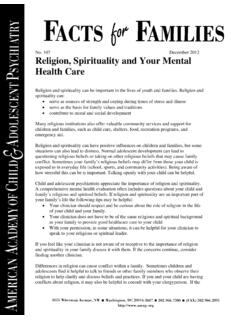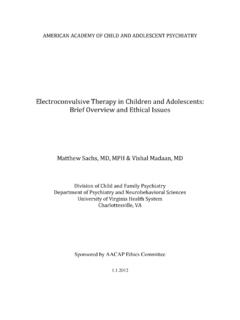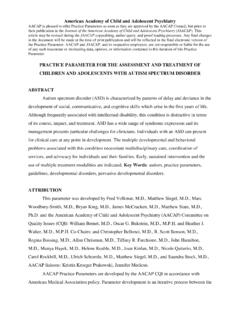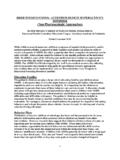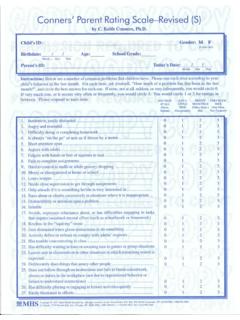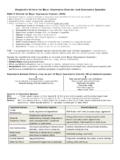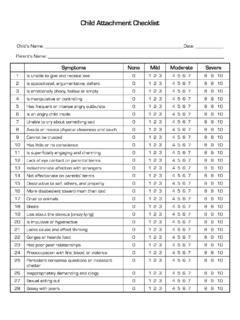Transcription of Disruptive Mood Dysregulation Disorder
1 No. 110 May 2013 Disruptive mood Dysregulation Disorder Disruptive mood Dysregulation Disorder (DMDD) is a relatively new diagnosis in the field of mental health. Children with DMDD have severe and frequent temper tantrums that interfere with their ability to function at home, in school or with their friends. Some of these children were previously diagnosed with bipolar Disorder , even though they often did not have all the signs and symptoms. Research has also demonstrated that children with DMDD usually do not go on to have bipolar Disorder in adulthood. They are more likely to develop problems with depression or anxiety. Many children are irritable, upset or moody from time to time. Occasional temper tantrums are also a normal part of growing up. However, when children are usually irritable or angry or when temper tantrums are frequent, intense and ongoing, it may be signs of a mood Disorder such as DMDD. Symptoms of DMDD The symptoms of DMDD include: Severe temper outbursts at least three times a week Sad, irritable or angry mood almost every day Reaction is bigger than expected Child must be at least six years old Symptoms begin before age ten Symptoms are present for at least a year Child has trouble functioning in more than one place ( , home, school and/or with friends) Some of the symptoms associated with DMDD are also present in other child psychiatric disorders , such as depression, bipolar Disorder and oppositional defiant Disorder .
2 Some children with DMDD also have a second Disorder , such as problems with attention or anxiety. This is why it is particularly important to get a comprehensive evaluation by a trained and qualified mental health professional. What To Do The treatment for DMDD will be individualized to the needs of the particular child and his or her family. It may include individual therapy, as well as work with the child s family and/or school. It may also include the use of medication to help address specific symptoms. Parents of children with DMDD should learn as much as they can about the Disorder . They should ask lots of questions about the risks and benefits of specific treatment options before deciding what is best for their child. If they have questions or concerns about the diagnosis or treatment alternatives, they should always feel free to get a second opinion. Having a child with DMDD can be a challenging experience. Appropriate treatment for your child is important.
3 However, it is also important to make sure you have the information, support and assistance you need. More information about children with DMDD and other challenging behaviors is available from: The Balanced Mind Foundation at National Alliance on Mental Illness at Mental Health America at For more information, see Facts for Families: #4 The Depressed Child #6 The Child Who Can t Pay Attention (ADHD) #33 Conduct Disorder #38 Bipolar Disorder #47 The Anxious Child #52 Comprehensive Psychiatric Evaluation #55 Understanding Violent Behavior in Children and Adolescents #72 Oppositional Defiant Disorder If you find Facts for Families helpful and would like to make good mental health a reality, consider donating to the Campaign for America s Kids. Your support will help us continue to produce and distribute Facts for Families, as well as other vital mental health information, free of charge. The American Academy of Child and Adolescent Psychiatry (AACAP) represents over 8,500 child and adolescent psychiatrists who are physicians with at least five years of additional training beyond medical school in general (adult) and child and adolescent psychiatry.
4 Facts for Families information sheets are developed, owned and distributed by AACAP. Hard copies of Facts sheets may be reproduced for personal or educational use without written permission, but cannot be included in material presented for sale or profit. All Facts can be viewed and printed from the AACAP website ( ). Facts sheets may not be reproduced, duplicated or posted on any other website without written consent from AACAP. Organizations are permitted to create links to AACAP's website and specific Facts sheets. For all questions please contact the AACAP Communications & Marketing Coordinator, ext. 154. If you need immediate assistance, please dial 911. Copyright 2013 by the American Academy of Child and Adolescent Psychiatry.
